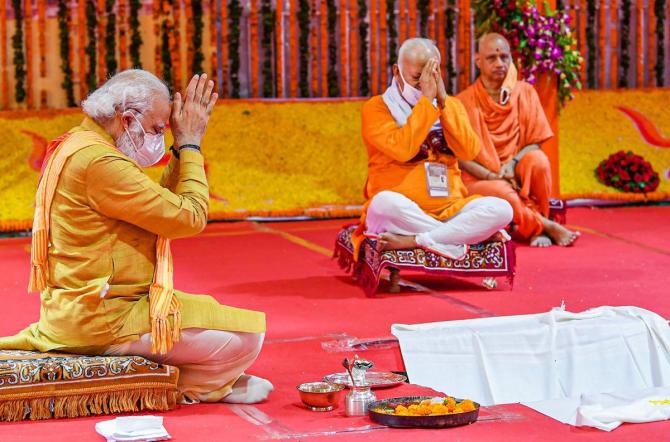Much depends on the BJP's electoral performance in next year's assembly elections.
If the party fares well in UP and some other states like Goa and Gujarat, it will be able to fob off the attempt at a reappraisal of its Hindutva doctrine, observes Amulya Ganguli.

When Atal Bihari Vajpayee was prime minister, he ran the gauntlet of then Rashtriya Swayamsevak Sangh chief K S Sudarshan's criticism of his moderation.
Now, the wheel appears to have turned a full circle with a hint of the unease in the RSS about the Bharatiya Janata Party's Hindutva radicalism.
As much is evident from some of the current RSS head Mohan Bhagwat's recent observations.
One denoted his outreach to Muslims with the remark that they share the same DNA as Hindus and the other was a criticism of the government's complacency about the COVID-19 threat at the end of the first wave of the pandemic which led to a more devastating second wave.
However, it is Bhagwat's olive branch to the minorities which is significant.
Prime facie, it can be regarded as no more than a reiteration of Narendra Modi's sabka saath, sabka vikas, sabka vishwas mantra which emphasises broad-based development and the cultivation of trust among all communities.
But it is no secret that this advice is honoured more in the breach than in observance by the saffron foot soldiers. To them, the Muslims (and Christians) remain a clear and present danger to society.
It is to counter them that BJP state governments enact laws against inter-faith marriages and religious conversion.
It is possible that the RSS has finally noted the resultant disquiet among the minorities and its harmful electoral impact on the BJP.
Hence, the talk about brotherhood.
At the same time, the RSS cannot but be perturbed by the criticism which Bhagwat himself is facing from the Hindu Right, which is an unprecedented development in the generally disciplined Sangh Parivar.
What this indicates is that Hindu radicalism has reached a stage under the Modi-Amit Shah-Yogi Aditynath dispension where voices of moderation even by the Parivar's paterfamilias are not only ignored but even derided.
Even if such divergence of opinions is seen as a replay of the Vajpayee-Sudarshan spat, its implications are wider because during the earlier standoff, the rest of the Parivar had remained silent even if its members had quietly sided with one side or the other.
But never before had the saffron fraternity experienced an open disagreement on an ideological issue.
Moreover, the present tiff is not a relatively minor one like the one between Vajpayee and Sudarshan on the free market, but concerns the Parivar's longstanding anti-minorities worldview.
Obviously, neither side can back down without losing face.
For the RSS to do so will mean that it has lost control over its family members, thereby making it a target of disparagement by the Left-Liberals.
True, the RSS has gone through such phases in its 96-year history, notably in the aftermath of Mahama Gandhi's assassination and during the Emergency.
But, in those days, the RSS had its political wing, the Jan Sangh (now the BJP), with it.
The Parivar has never split, making one of its stalwarts, Vijayaraje Scindia, gloat over its unity even after the Babri Masjid demolition.
But, now, the intra-family strains can have a debilitating impact.
For the BJP to back down will mean confusing and alienating the Hindu Right who represent its core group of supporters.
Such a turn of events will be electorally damaging since both the party's right-wing cadres and camp followers of the RSS will distance themselves from the BJP's poll campaign.
If this happens, the BJP's supporters will regretfully believe that the party lost the plot just when it was making discernible headway in establishing itself as a major force in Indian politics.
There is little doubt that Bhagwat's advisory is a genuflection in the direction of the nation's famed diversity.
It is a reality which Vajpayee acknowledged, much to Sudarshan's chagrin, but is seemingly ignored by the Modi-Shah duo because 'they have no training in appealing to the diversity of India', as Vinay Sitapati has written in his book, Jugalbandi: The BJP before Modi.
Because of this lack of 'training', they are 'more ruthless to political opponents than Vajpayee-Advani ever were', according to Sitapati.
If Bhagwat is engaged in an ideological perestroika, he has embarked on an ardous and even perilous journey because nothing is more unpredictable than a u-turn in the realm of dogma.
Not that it hasn't been done before, but the consequences have often been deeply unsettling. The Soviet Union fell apart in the wake of Mikhail Gorbachov's glasnost-perestroika experiment while the Indian Communists splintered as they could not cope with the fallout of the row between the Soviet Union and China.
But the British Labour party survived the marginalisation of its 'loony Left' faction as did the Congress in India despite the 1907, 1969 and 1978 splits.
All these ruptures were tumultuous events.
In contrast, the present signs of difference within the Hindutva camp are a muted affair, presumably because they are yet to be forcefully articulated by either side.
It is also possible that they will subside as one side or the other calls it a day.
But much depends on the BJP's electoral performance in next year's assembly elections.
If the party fares well in UP and some states like Goa and Gujarat, it will be able to fob off the attempt at a reappraisal of the Hindutva doctrine.
If not, the country will be in for what the Chinese call 'interesting times' to denote a period of turbulence.
Amulya Ganguli is a writer on current affairs.
Feature Presentation: Aslam Hunani/Rediff.com










